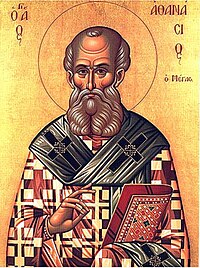Flavius Dalmatius
Flavius Dalmatius († 337/38), also known as Dalmatius the Censor , was the son of Constantius Chlorus and his wife Theodora and thus half-brother of Constantine the Great . As a member of the Constantinian dynasty, Dalmatius gained considerable influence at the court of Constantine, who appointed him consul of the year 333 and revived the title of censor for him . Dalmatius was finally murdered in 337 or 338 - like his sons Dalmatius and Hannibalianus - in the turmoil after the death of Constantine .
Contemporary history background
The Roman Empire went through a profound change at the beginning of the 4th century. Dalmatius' half-brother Constantine the Great had prevailed in the succession struggles that broke out with the end of the tetrarchy founded by Emperor Diocletian , and thus established the Constantinian dynasty , to which Dalmatius also belonged.
His reign was significant for two main reasons: On the one hand, Constantine relocated the central power with the new capital Constantinople to the eastern part of the empire, which had already gained more and more importance. On the other hand, he promoted Christianity and thus initiated the Christianization of the Roman Empire. Even if the traditional gods were not abolished, they lost their power and influence.
Life
Dalmatius was a son of Constantius Chlorus and his wife Theodora . His siblings were Julius Constantius , Flavius Hannibalianus , Constantia , Anastasia and Eutropia . He was probably the eldest son - apart from Constantine , who came from another connection of his father's . Dalmatius spent his youth in the Gallic town of Tolosa, today's Toulouse , allegedly because Constantine's mother Helena kept him away from court. His two sons Dalmatius and Hannibalianus were probably born there. In the course of the 320s he returned to Constantinople to the court of his half-brother and was appointed consul in 333 together with Domitius Zenofilus . At the same time he was awarded the old title of censor , which Constantine evidently revived especially for his half-brother.
In 334, Dalmatius resided in Antioch , where he was investigating the case of the Antiarian bishop Athanasius , who was charged with murder. In the same year, Dalmatius suppressed the revolt of Calocaerus , who had been proclaimed emperor in Cyprus . Dalmatius had the usurper burned in Tarsus . The following year he and some soldiers saved Athanasius at the Council of Tire . His story of suffering was far from over. A possible further ascent was denied Dalmatius, because after the death of Constantine in May 337 he fell victim to a purge carried out by soldiers . The younger Dalmatius and Hannibalianus were also killed. It is uncertain who commissioned these murders and when exactly they took place.
literature
- Timothy D. Barnes : The New Empire of Diocletian and Constantine . Harvard University Press, Cambridge / London 1982, ISBN 0-674-61126-8 , pp. 105 .
- Bruno Bleckmann : Flavius Dalmatius [1]. In: The New Pauly (DNP). Volume 3, Metzler, Stuttgart 1997, ISBN 3-476-01473-8 , column 287 f.
- Wilhelm Enßlin : Dalmatius Censor, the half-brother of Constantine I. In: Rheinisches Museum für Philologie . tape 78 , 1929, pp. 199-212 ( PDF ).
- Arnold Hugh Martin Jones , John Robert Martindale, John Morris : Fl. Dalmatius 6. In: The Prosopography of the Later Roman Empire (PLRE). Volume 1, Cambridge University Press, Cambridge 1971, ISBN 0-521-07233-6 , pp. 240-241.
- Klaus Rosen : Julian. Emperor, God and haters of Christians . Klett-Cotta, Stuttgart 2006, ISBN 3-608-94296-3 , p. 37, 49-50 .
- Otto Seeck : Delmatius 2 . In: Paulys Realencyclopadie der classischen Antiquity Science (RE). Volume IV, 2, Stuttgart 1901, Col. 2455 f.
Web links
- Michael DiMaio, Jr .: Short biography (English) at De Imperatoribus Romanis (with references).
Remarks
- ↑ a b Eutropius 9.22 ; Zonaras 12.33.
- ↑ a b Papyrus Oxyrhynchus 1716.
- ↑ a b c Athanasius , Two writings against the Arians 76 ; Socrates Scholastikos 1,27,19-21 , who wrongly called Dalmatius the nephew of the emperor.
- ↑ a b Zosimos 2,40,2 ; Libanios, speeches 18:31.
- ^ Cf. Otto Seeck : Delmatius 2 . In: Paulys Realencyclopadie der classischen Antiquity Science (RE). Volume IV, 2, Stuttgart 1901, Col. 2455–2456, here: 2455. Dalmatius was the first of the brothers to become consul and is always mentioned first in lists.
- ↑ Ausonius , Commemoratio professorum Burdigalensium 17:11.
- ↑ Libanios , Speeches 1,434.
- ↑ The sons Anonymus Valesianus 6, 35 ; Ausonius, Commemoratio professorum Burdigalensium 18.9; Epitome de Caesaribus 41.15 ; 41.20 .
- ↑ On Calocaerus Anonymus Valesianus 6.35 ; Aurelius Victor , Liber de Caesaribus 41:11 ; Orosius , Historiae adversum Paganos 7,28,30.
- ↑ Epitome de Caesaribus 41:18 ; Eutropius 10.9 .
- ↑ On the murders after Constantine's death see for example Richard Klein : The struggles for the succession after the death of Constantine the Great . In: Raban von Haehling , Klaus Scherberich (Ed.): Roma versa per aevum. Selected writings on pagan and Christian late antiquity (= Spudasmata ). tape 74 . Olms, Hildesheim / Zurich / New York 1999, ISBN 3-487-11032-6 , p. 1-49 .
| personal data | |
|---|---|
| SURNAME | Dalmatius, Flavius |
| ALTERNATIVE NAMES | Dalmatius the censor |
| BRIEF DESCRIPTION | Consul and censor under his half-brother Constantine the Great |
| DATE OF BIRTH | 3rd century or 4th century |
| DATE OF DEATH | 337 or 338 |
